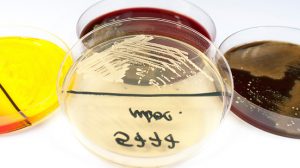
The latest study was conducted by researchers at Johns Hopkins Bloomberg School of Public Health and the findings were published in the Proceedings of the National Academy of Sciences.
The immune system works to fight off infection by busting out free radicals from the cells which kills germs. When Candida albicans enters the body copper is used to neutralize the free radicals, thus stopping it from killing the fungus. When the body senses fungus it flushes copper into the bloodstream, allowing copper-starved fungus to enter such places like the kidneys.
Candida albicans, unlike other fungi, has evolved to switch from copper to metal manganese, as observed by researchers. Study lead Valeria C. Culotta said, “What we have found here is a very clever adaptation to changes in copper during infection. The more we learn about this pathogen’s ability to survive inside a human, the more points of vulnerability we may identify.”
When Candida albicans enters the bloodstream it has the potential to be deadly; it can affect the liver, spleen and kidneys. Those with weaker immune systems are more susceptible to the lethal effects of Candida albicans.
Both copper and manganese are found within the human body and are consumed through food. Because of copper’s ability to reduce illness and the spread of germs, some hospitals in the United Kingdom have switched their door handles to copper because germs cannot live on the metal.
Many antifungal treatments work on the surface to kill the fungus, but with a growing resistance in humans to antifungal medications, fungi have been able to evolve thus making them unresponsive to treatment.
Researchers are hopeful that future treatment of Candida albicans will work by disrupting its ability to switch metals.
Fungal infections risk and immune system
Fungal infections are most common in those with impaired immune systems, but typically fungal infections are quite rare. Medications, too, can weaken a person’s immune system making them more susceptible to fungal infections. Medications which treat arthritis, asthma, allergic reactions and autoimmune diseases are commonly found to weaken a person’s immune system.
Some fungal infections, like mouth infection thrush, are non-life threatening, but other fungal infections, like invasive Candida infection, invasive Aspergillosis and histoplasmosis can be lethal.
Candida yeast infection symptoms
- Itching and irritation of the vagina
- Burning sensation, more so during intercourse or urination
- Redness and swelling of the vulva
- Thick, white, odor-free vaginal discharge
A person can develop a complicated form of Candida yeast infection if:
- Severe redness and swelling is present
- Yeast infections are recurrent
- You’re pregnant
- You have uncontrolled diabetes
- You have a weakened immune system either from medications or HIV/AIDS
Causes and risk factors of Candida yeast infection
The cause of a yeast infection is from the fungus Candida. Candida is commonly found in the vagina but is balanced with bacteria. When the balance between Candida and bacteria is disrupted, it allows for overgrowth of Candida which leads to symptoms like redness, swelling and itchiness.
Other causes which can contribute to Candida yeast infection are:
- Antibiotic use
- Pregnancy
- Uncontrolled diabetes
- Impaired immune system
- Anything which changes the balance between bacteria and Candida
Typically, yeast infections from Candida albicans can easily be treated, but yeast infections caused by other fungi may be more difficult to treat.
How to prevent Candida yeast infections
It is reported that nearly 75 percent of women will experience a Candida yeast infection in their life, but you don’t have to be one of them. Below are effective tips in order to prevent Candida yeast infections.
- Wear cotton underwear
- Avoid tight-fitting pants
- Avoid nylon pantyhose or synthetic leotards
- Always change out of damp bathing suits or workout gear immediately
- Don’t use douches or scented napkins
- Wipe from front to back
- Control diabetes
- Speak with your doctor about preventative antifungal therapy after you use antibiotics
- Eat a healthy diet
- Manage stress
- Practice good hygiene – wash carefully and dry well
- Be mindful of medications you take and speak with your doctor about their risk to weaken your immune system thus making you more prone to Candida yeast infections
- Sleep well
How to boost your immune system
A weak immune system can make a person at higher risk to develop a fungal infection; therefore, it is important to boost your immune system, especially as you continue to age. Tips to boost your immune system include:
- Get proper sleep and reduce stress
- Don’t smoke
- Minimize alcohol consumption
- Eat plenty antioxidant-rich foods – fruits and vegetables
- Consider probiotics
- Consume garlic for its immune-boosting abilities
- Exercise
- Control blood pressure
- Maintain a healthy weight
- Get an annual check-up with your doctor to determine your risk and catch any infections early-on
Related Reading:
Facts about candidiasis (yeast infection)
You’ve probably heard of baker’s yeast that helps bread rise, or even brewer’s yeast that helps beer ferment. In the food realm, these are the good ones. But there’s a bad kind of yeast too. At least, when it gets out of control. There is a type of yeast called Candida that occurs naturally in our intestines, genital tract and throat. Continue reading…
Urinary tract infection detected faster with device
A UTI is an infection which occurs in the urinary tract. Kidney, urethra, bladder and urine can all become affected due to bacteria. Women typically develop UTIs more often than men. UTIs can be harmless and cause minor discomfort or, if the infection travels to the bladder, can become quite severe leading to pain and kidney damage. Continue reading…
Sources:
http://www.newswise.com/articles/clever-adaptation-allows-yeast-infection-fungus-to-evade-immune-system-attack
http://www.mayoclinic.org/diseases-conditions/yeast-infection/basics/risk-factors
http://www.cdc.gov/fungal/infections
http://www.webmd.com/skin-problems-and-treatments/guide/candidiasis-yeast-infection
http://www.webmd.com/women/guide/10-ways-to-prevent-yeast-infections
http://www.everydayhealth.com/yeast-infection/prevention
http://www.everydayhealth.com/columns/white-seeber-grogan-the-remedy-chicks/ten-simple-natural-ways-to-boost-immune-system
http://www.cdc.gov/fungal/infections/immune-system
http://www.health.harvard.edu/staying-healthy/how-to-boost-your-immune-system